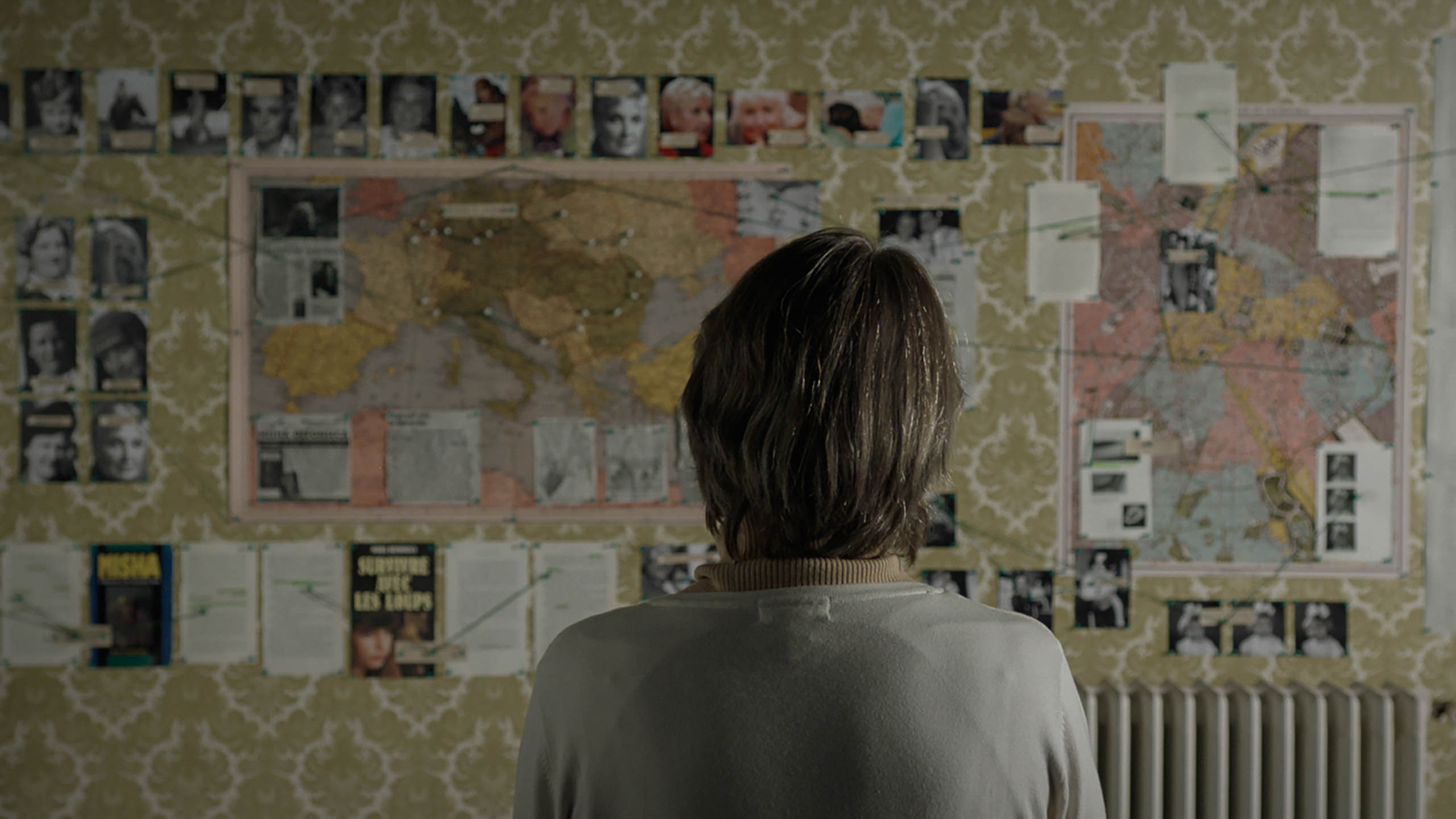In the first 15 minutes of Misha and the Wolves, the latest popcorn-suspense documentary now streaming on Netflix, you might understandably ask a few questions. The titular Misha Defonseca, staring intensely at the camera, tells what sounds like an impossible story of Holocaust survival: she was hidden in a Belgian Catholic house; her foster parents mistreated her, spurring her escape; she trekked eastward, to Germany, to find her real parents; she survived the snowy journey thanks only to the kindness of a pack of wild wolves that adopted her, saving her scraps of food and defending her from enemies.
If you haven’t heard Defonseca’s story, odds are you live in North America, where her book, Misha: A Mémoire of the Holocaust Years, didn’t take off as much as it did in Europe. Defonseca toured the French-language media world, giving TV interviews and selling the rights to a production studio, which adapted her story for the screen.
Few people involved in the buying and selling of this story asked the questions you’d ask during the opening of this movie: Why would these Catholic Belgians take in a Jewish girl only to mistreat her? How did a seven-year-old survive in the woods? How did she know which way was east? Who in their right mind walks toward Germany in the early 1940s?
You might see where this is going.
Defonseca’s first publisher, a woman who ran an independent publishing house in their small Massachusetts town, had a falling out with the author. After a bitter lawsuit, a judge slapped the publisher with a $22-million judgment she couldn’t pay. Broken and desperate, she began re-examining Defonseca’s tale, this time noticing inconsistencies. She began asking the same questions that, to an audience member in 2021 watching a tightly streamlined Netflix documentary, seem obvious.
I’ll note here that it’s impossible to dig into Misha and the Wolves without giving away spoilers, so from here on I won’t even try.
Yes, the whole thing turns out to be fake. You may argue this isn’t a true spoiler, since the story is more than a decade old and very much public: Misha Defonseca is not her real name; she did not live with wolves; she isn’t even Jewish. In reality, her name is Monique de Wael, and she was the daughter of a Belgian resistance fighter who was tortured into naming names and subsequently accused of being a traitor and collaborator. Somewhere along the way, she moved to the United States and changed her name, reinventing her childhood to erase those harsh memories.
If her story is more complicated than that, we may never know, because Misha and the Wolves doesn’t (or can’t) explain much beyond that narrative. Left without more twists and turns, halfway through the movie, director Sam Hobkinson decides to invent his own.
Remember when I said the titular Misha Defonseca tells her story directly to the camera? Once the hoax is unveiled, the woman we’ve been led to believe is Defonseca stands up, walks backstage and begins to remove her wig and makeup. This is perhaps the real “spoiler” to the film: the woman we’ve been watching is an actress, not the real Defonseca, who chose not to appear in the film.
Consequently, much of the second half’s B-roll comprises turning the cameras on the documentary crew itself while they dismantle the set we believed was her house—more than an acknowledgement of artificiality, these intimate slow-motion shots of men taking down portraits and loading up a truck hint at the filmmakers revelling in their manipulation of their audience, much as de Wael may have.
It’s a cute trick, and it elevates the movie somewhat beyond the standard emotive character journey that it’s been until this point, equal parts Errol Morris–style head-on interviews and true-crime horror music. But even though the movie keeps going, the momentum pretty much ends there. The woman made the story up. That’s it.
Like most of Netflix’s popcorn docs, this one is glossy and fun to watch, but fails to justify its runtime. It’s a story that could be summed up in a sentence, perhaps better explained in a longform print article, potentially meaty enough to fill an hour-long documentary, instead fluffed into a 90-minute one. How do the filmmakers pack the runtime? With multiple characters repeating the same thing; with long shots of overcast small towns and investigators poring over historical records, accompanied by eerie strings and sparse piano; with slow-motion “gotcha” shots of the film crew dismantling the movie’s own set pieces.
All this being said, my gripe may not be with Hobkinson’s directorial choices—he keeps things moving smoothly and makes sure nobody gets lost along the way. (Dumbing down what is certainly a more convoluted story, involving intricate historical records and a $22-million lawsuit, is appreciated.)
The true problem may lie with de Wael herself, whose character arc feels as hollow as her fabrication. We’re yearning for answers. Maybe she was delusional and earnestly believed these things happened? Maybe she spent some time in the woods during the war? After all, she was a child during the Holocaust: her memories can’t be perfect. Maybe her story is only partially invented?
Nope. It’s a whole-cloth invention. Delightfully, a savvy Holocaust historian appears near the end of the film to summarize this so perfectly I’m going to quote her at length: “I think we would like to believe that we were not so naive, that we believed because she believed it. And we would even like to believe that this narrative has a redemptive purpose, because it made right the wrong of her childhood. I think it’s nonsense. There is no redemptive purpose. We were so naive. It was all a fabrication.”
It’s a summary only a Holocaust historian could make. Sometimes, people just do bad things. Evil exists. Manipulation exists. People take advantage of Holocaust survivors. There’s no logic behind it. Struggle for meaning as we might, sometimes there isn’t any.
